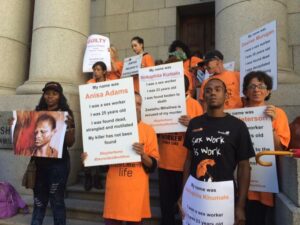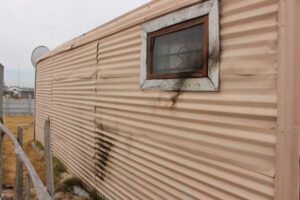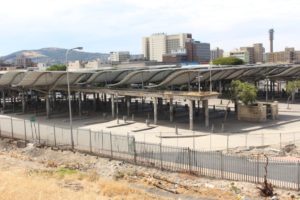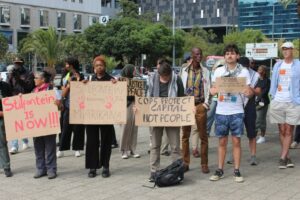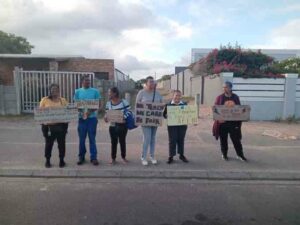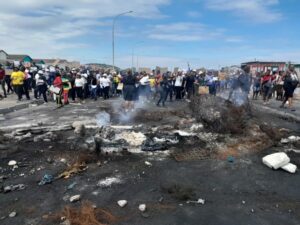A group of activists from Hillcrest, along with Move One Million, Keep Crestone Clean and Eco Group, lined themselves up on Hillcrest Old Main Road forming a human chain from one Shell garage to the next to protest the oil giant’s intention to conduct an offshore seismic survey in search of oil and gas. Shell’s announcement about the survey sparked public outrage with calls for a boycott of Shell garages. The oil company announced that the survey for oil and gas off the Wild Coast in the Eastern Cape, from Morgan Bay to Port St Johns, will commence from 1 December for four to five months.
Jane Cheryl Gilbert Schofield, one of the organisers from Move One Million, said that everyone came together as concerned South Africans who care passionately about the country’s costal region, its sea life and eco system. “I would like to thank everyone for a good morning turn out, my head was overwhelmed with sadness and joy at the same time. I am sure if the ocean animals and sea creatures could have seen you all there in the hot sun, they would be reaching out to say thank you for trying to save us,” Schofield said.
Another protester, Suzan Porters said Shell garages should be boycotted so that they will see that what they are doing will have a negative impact on the marine life. Meanwhile, the Portfolio Committee on Mineral Resources and Energy concluded the KwaZulu-Natal leg of public hearings on the Gas Amendment Bill in Durban’s Westville community on Saturday, where the participants called for, among other things, the Broad Based Black Economic Empowerment (BBBEE) policy to work for them.
The participants told the committee that the gas industry is still inaccessible for them. They complained that they do not get licenses to participate in the gas industry. They said that although the application process to get a license should take 60 days, the application process for them takes forever. The committee heard that there is a R2-million penalty for non-compliance by small scale-enterprises.
Chairperson of the committee, Sahlulele Luzipo, informed the participants that the committee will engage the Portfolio Committee on Environment, Forestry and Fisheries on the issues of pollution impacting on communities and the environment. The bill will also be sent to the National Council of Provinces which will determine the communities where further public hearings must be held.
The oil company announced that a seismic survey for oil and gas along the Wild Coast will commence from 1 December for four to five months.
On Shell’s website it states,” We are planning to commence a 3D seismic survey off the Wild Coast, where we believe there may be potential hydrocarbon deposits beneath the seabed. We have met all the legal obligations to undertake this activity in line with the regulations and received the necessary approvals. This has also been confirmed by Government.”
According to the energy corporation, they are targeting a specific area within their exploration block where they believe there may be fossil fuel beneath the seabed. “To understand if there could be commercially viable resources, we need to build up an image of what the subsurface looks like in our targeted survey area. To image the subsurface, one must undertake a seismic survey. Data is collected from this survey on the subsurface and is processed and interpreted to try and find a specific location where there may be a prospective resource. South Africa has already had a number of similar surveys safely completed, and planned for off our coastline.”
Despite the public outrage, Shell’s spokesperson Pam Ntaka said that they are going ahead with the survey. She said Shell has long experience in collecting seismic data and that the welfare of wildlife is a major factor in the stringent controls used. Shell follows the international guidelines of the Joint Nature Conservation Committee.
Since last week, environmental group Oceans Not Oil has been holding protests and driving the campaign against offshore oil and gas development. The group in a public statement said Minister of Minerals and Energy Resources, Gwede Mantashe is hell bent on a gas driven economy. “The problem with this is that we are behind the curve. We have neither the market nor the infrastructure established for it and very few power stations capable of being converted. This means we’re 15-20 years away from that economy at best. We do, however, have a growing renewable sector that is becoming viable cost-wise. Also, the unabated use of natural gas is incompatible with achieving the climate-neutrality objective by 2050. Its use will have to be reduced by over 70 % of current use in 2021.
“Studies show further development of gas infrastructure is incompatible with the Intergovernmental Panel on Climate Change (IPPC) target of keeping global increases in temperature below 2°C. This all begs the question of the employment outlook, a just transition, economics and plain logic in the South African context. South Africa has already warmed at around twice the rate of global warming,” the organisation said. A petition started by Oceans Not Oil, seeking to block the survey, has garnered nearly 300,000 signatures, as at Friday 26 November, 2021.
More protests against Shell are planned for 5 December across the country.
